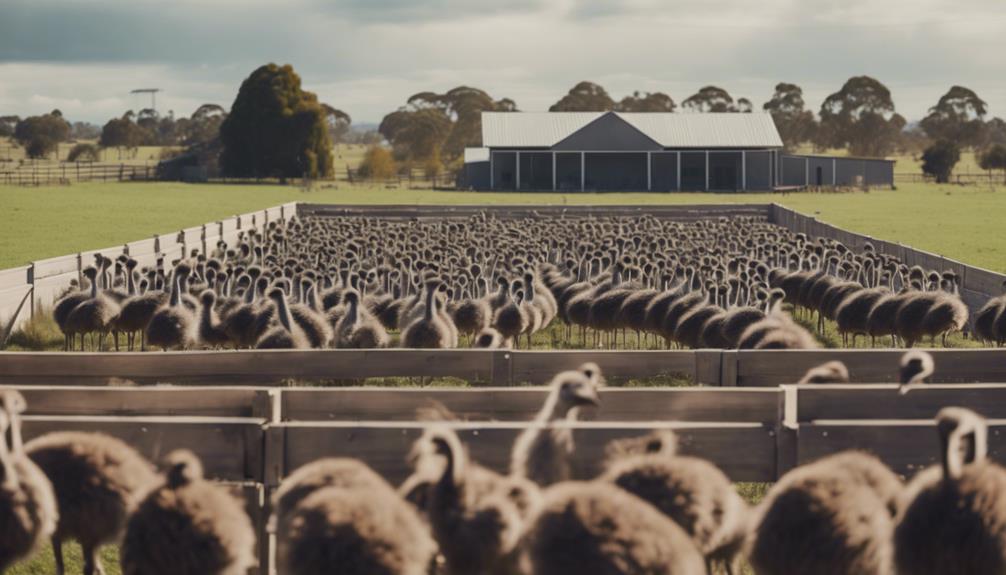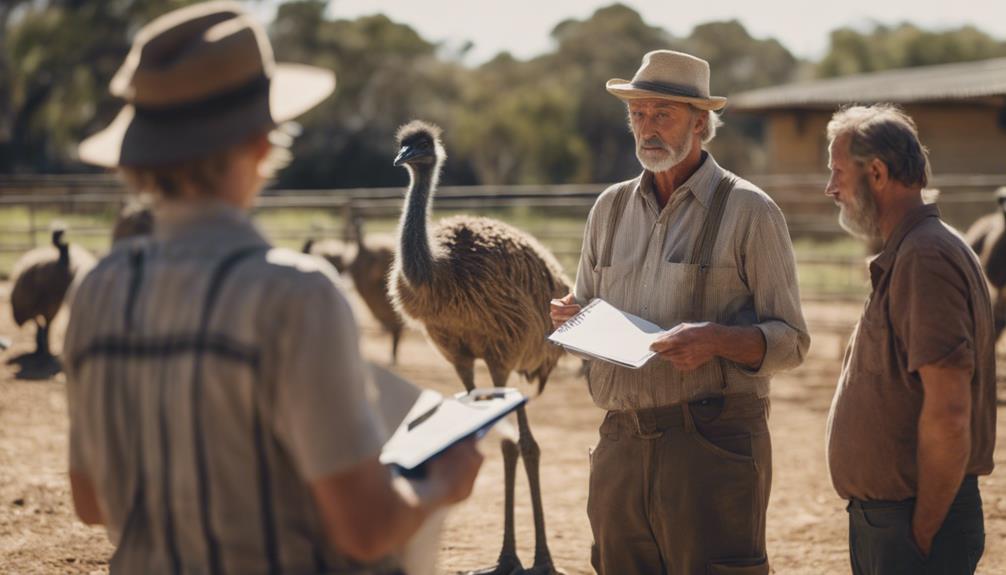
Imagine the vast open fields of your future emu farm, the gentle breeze carrying the promise of a new venture. Starting an emu farm requires meticulous planning and attention to detail. From understanding the needs of these unique birds to navigating the legal requirements, each step is crucial for your success. So, where do you begin on this journey towards establishing a thriving emu farm?
Key Takeaways
- Secure necessary permits and licenses before starting.
- Design spacious, sheltered enclosures with secure fencing.
- Source quality emu eggs or chicks from reputable breeders.
- Conduct health screenings for breeding birds to prevent diseases.
- Plan marketing strategies and establish effective distribution channels.
Research Emu Farming Basics

To begin your journey into emu farming, research the essential basics of caring for and raising these unique birds. Emus are fascinating creatures that require specific care to thrive on your farm. Understanding their dietary needs is crucial. Emus are omnivores, so their diet should consist of a balanced mix of seeds, fruits, and insects. Additionally, they need access to fresh water at all times.
Creating a suitable living environment is another critical aspect of emu farming. These birds need ample space to roam and exercise. Fencing should be secure and high enough to prevent them from escaping. Emus are also sensitive to temperature changes, so providing shelter from extreme weather conditions is essential.
Regular health check-ups and proper grooming are vital for the well-being of your emus. Establish a relationship with a veterinarian experienced in treating these birds. Understanding the behavioral patterns of emus will also help you detect any signs of illness or distress early on. By thoroughly researching these fundamental aspects of emu care, you'll set a solid foundation for a successful emu farming venture.
Choose the Right Emu Breed
Selecting the appropriate emu breed for your farm requires careful consideration of various factors such as temperament, size, and productivity. The most common emu breeds for farming purposes are the Standard emu and the American emu.
The Standard emu is known for its good temperament, making it easier to handle and manage, especially for beginners. They're also larger in size, which can be beneficial if you're looking to raise emus for their meat.
On the other hand, the American emu is a smaller breed but is highly productive in terms of egg-laying. If your primary focus is on harvesting emu eggs, the American emu might be the ideal choice for your farm.
Consider your farm's goals and objectives when selecting the right emu breed, as each breed has its strengths that can align with your specific needs. Make an informed decision to set a strong foundation for your emu farming venture.
Secure Necessary Permits and Licenses

When setting up your emu farm, one of the initial steps to consider is obtaining the necessary permits and licenses required for operation. Before delving into the intricate details of designing your emu enclosures, it's imperative to ensure that you have all the legal aspects in place.
To wield power in the realm of emu farming, you must navigate the bureaucratic landscape with finesse. Approach your local agricultural department or relevant regulatory body to inquire about the specific permits needed to establish and run an emu farm in your area. These permits may encompass zoning permissions, animal welfare regulations, and any other mandates governing livestock farming activities.
Securing the appropriate licenses demonstrates your commitment to operating your emu farm within the confines of the law. It showcases your authority in the industry and instills confidence in potential stakeholders. Failure to acquire the necessary permits could result in severe repercussions, jeopardizing your venture before it even takes flight.
Design and Set up Emu Enclosures
Ensure your emu enclosures are designed with adequate space and shelter to meet the specific needs of these large birds. Emus require ample space to roam and exercise, so each bird should have at least 100 square feet of outdoor space. The fencing should be at least 6 feet high and secure to prevent escapes. Emus are prone to stress, so create a sheltered area where they can retreat from extreme weather conditions. The shelter should have good ventilation and be spacious enough for all your emus to comfortably gather.
When designing the enclosures, consider the terrain and vegetation. Emus prefer a natural environment with access to grassy areas and shrubs. Ensure the enclosure has both sunny and shaded spots to accommodate their preferences. Additionally, emus are curious birds and may try to eat plants within their reach, so be cautious of toxic vegetation.
Source Quality Emu Eggs or Chicks

To successfully start your emu farm, securing quality emu eggs or chicks is paramount for ensuring a healthy and thriving flock. When sourcing emu eggs, ensure they come from reputable breeders with a track record of producing healthy chicks. Look for eggs that are clean, undamaged, and ideally less than seven days old to maximize hatchability. It's crucial to inspect the eggs carefully before purchasing to avoid any potential issues that could affect the development of the chick.
If you opt for purchasing chicks instead of eggs, select ones that are alert, active, and free from any signs of illness. Healthy chicks should have well-formed legs, bright eyes, and smooth feathers. When obtaining chicks, inquire about their vaccination history and ensure they've received necessary vaccinations to prevent common diseases. Proper transportation of chicks is vital to minimize stress and ensure their well-being upon arrival at your farm.
Implement a Feeding and Nutrition Plan
Developing a well-rounded feeding and nutrition plan is essential for the optimal health and growth of your emu flock. Emus require a diet rich in protein, vitamins, and minerals to thrive. A balanced diet for emus typically consists of high-quality emu feed pellets, fresh water, and occasional treats like fruits and vegetables. Emus are herbivores, so their diet should be primarily plant-based.
Ensure that the emu feed you provide is specifically formulated for emus to meet their nutritional needs. Emus also benefit from access to grit or small stones, which help them grind down their food in their gizzard since they lack teeth. Monitor their food intake carefully to prevent overfeeding or underfeeding, as both can lead to health issues.
To optimize their growth and health, consider consulting with a veterinarian or an emu farming expert to tailor a feeding plan that suits your flock's specific requirements. Remember, a well-fed emu is a healthy and productive emu.
Establish a Health Care Routine

What key practices should you integrate into your routine to ensure the health and well-being of your emu flock? Maintaining the health of your emus is crucial for a successful farm. Start by implementing a regular health check schedule. Inspect each emu for signs of illness or injury daily. Monitor their weight, behavior, and overall appearance. Have a veterinarian perform regular check-ups to catch any potential issues early on.
Establish a vaccination program tailored to your region and the specific diseases prevalent in your area. Vaccinate your emus against common diseases such as avian influenza and fowl cholera. Keep detailed records of vaccinations and health assessments for each bird.
Implement a parasite control program to prevent issues like mites and internal parasites. Regularly inspect your emus for signs of parasites and treat them promptly. Ensure that your farm environment is clean and well-maintained to minimize the risk of parasitic infestations.
Develop a Breeding Program
When establishing a breeding program for your emu farm, prioritize selecting healthy breeding pairs to ensure the genetic diversity and vitality of your flock. This is crucial for the long-term success and sustainability of your emu farm.
Here are some key steps to consider:
- Genetic Diversity: Choose breeding pairs that are genetically diverse to prevent inbreeding and promote overall flock health.
- Physical Traits: Select birds with desirable physical traits such as size, feather quality, and coloration to improve the quality of future generations.
- Health Screening: Conduct thorough health screenings of potential breeding birds to identify any underlying health issues and prevent the spread of diseases within the flock.
- Breeding Records: Keep detailed records of each breeding pair, including lineage, hatch dates, and any health issues, to track the progress and genetic history of your emu farm.
Plan for Marketing and Sales

To successfully market and sell your emu products, you must strategically identify target markets and establish effective distribution channels. Conduct thorough market research to understand the demand for emu products in your area. Consider selling emu meat, oil, feathers, and leather to various markets such as health food stores, restaurants, cosmetic companies, and craft makers. Developing a strong brand image for your products through quality and ethical farming practices will attract discerning customers.
When it comes to sales, consider both online and offline channels. Create a professional website showcasing your products and offering online purchasing options. Utilize social media platforms to reach a wider audience and engage with potential customers. Offline, establish relationships with local retailers and attend farmers' markets or trade shows to promote your products directly to consumers.
Remember to price your products competitively while ensuring you cover your production costs and make a profit. Implementing effective marketing strategies and providing excellent customer service will help build a loyal customer base and drive sales for your emu farm.
Join Emu Farming Associations
Consider joining emu farming associations to connect with industry professionals, access valuable resources, and stay updated on the latest trends and practices in the emu farming sector. Emu farming associations offer a plethora of benefits that can significantly enhance your farming venture:
- Networking Opportunities: Engage with seasoned emu farmers, suppliers, and experts to expand your professional circle.
- Educational Workshops: Attend workshops and seminars conducted by industry leaders to enhance your knowledge and skills in emu farming.
- Regulatory Updates: Stay informed about the ever-evolving regulations and compliance standards within the emu farming industry.
- Market Insights: Gain valuable insights into market trends, consumer preferences, and emerging opportunities to strategically position your emu farm for success.
Seek Mentorship and Guidance

For optimal growth and success in emu farming, engaging in mentorship and seeking guidance from experienced professionals is crucial. Building a network of mentors can provide you with valuable insights, strategies, and solutions to overcome challenges that may arise in your emu farming venture. Look for individuals who've a proven track record in the industry and are willing to share their expertise with you.
Establishing a mentor-mentee relationship can significantly accelerate your learning curve and help you avoid common pitfalls in emu farming. Experienced mentors can provide guidance on various aspects of the business, such as breeding techniques, nutrition requirements, health management, and marketing strategies. Their wisdom and advice can empower you to make informed decisions and navigate the complexities of running a successful emu farm.
Seek out mentorship opportunities through emu farming associations, agricultural workshops, or industry conferences. By learning from seasoned professionals and experts in the field, you can gain the knowledge and confidence needed to thrive in the competitive world of emu farming.
Monitor and Adjust Farm Operations
When managing an emu farm, closely monitoring and making necessary adjustments to farm operations is key to ensuring efficiency and success. To optimize your emu farm operations, consider the following:
- Regular Health Checks: Implement a routine health check schedule for your emus to detect any signs of illness or distress early on. This proactive approach can prevent disease outbreaks and ensure the well-being of your emus.
- Evaluate Feeding Regimen: Monitor the emus' feeding habits and adjust their diet as needed based on their growth stage and overall health. Providing balanced nutrition is essential for their development and productivity.
- Review Breeding Strategies: Regularly assess the breeding program to maximize genetic diversity and produce healthy offspring. Adjust breeding pairs if necessary to avoid inbreeding and maintain strong bloodlines.
- Track Financial Performance: Keep detailed records of expenses, revenue, and profits to analyze the financial health of your emu farm. Make informed decisions based on this data to drive profitability and sustainable growth.
Frequently Asked Questions
How Can I Protect My Emus From Predators on the Farm?
To protect your emus from predators on the farm, ensure sturdy fencing, install motion-activated lights or alarms, use guard animals like dogs or llamas, and regularly inspect for signs of intrusion. Vigilance and proactive measures are key.
What Is the Average Lifespan of an Emu in Captivity?
In captivity, emus typically live for about 10 to 20 years. Providing proper nutrition, space, and healthcare can help extend their lifespan. Regular veterinary check-ups and a well-maintained environment are crucial for their longevity.
Can Emus Be Kept in the Same Enclosure as Other Animals?
Yes, emus can be kept in the same enclosure as other animals, but caution is advised. Emus can be territorial and aggressive, especially during mating season. Ensure proper space, shelter, and supervision for all animals.
What Are Common Health Issues That Emus May Face?
When caring for emus, be vigilant about common health issues like bumblefoot, internal parasites, and heat stress. Regularly inspect their feet, provide proper nutrition, and ensure adequate ventilation to safeguard their well-being and power.
How Do I Handle and Train Emus for Interaction With Humans?
To handle and train emus for interaction with humans, establish trust through consistent positive reinforcement. Use treats to reward desired behaviors. Gradually introduce touch and handling, always respecting their boundaries. Be patient and gentle to build a strong bond.
Conclusion
Congratulations! You're now the proud owner of an emu farm. Remember, emus aren't just livestock, but majestic creatures with unique needs. Embrace the challenges, learn from setbacks, and celebrate successes.
Join the quirky world of emu farming, where every day brings a new adventure. Stay committed to your emus, and they'll reward you with their grace and wonder.
Happy farming!




